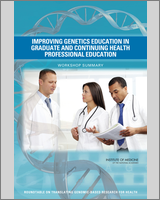NCBI Bookshelf. A service of the National Library of Medicine, National Institutes of Health.
Many health care providers do not have either the knowledge or the tools they need in order to apply genetic information in their day-to-day practices. This lack of support is contributing to a substantial delay in the translation of genetic research findings, when appropriate, into improvement in patient outcomes within the health care system. Although the need to improve genetics knowledge among health care providers is clear, the best approaches to educating health care providers in a way that produces meaningful changes in clinical practice are not, especially given the competing coursework and training needs that exist in today's increasingly complex health care settings.
To examine the potential and the challenges of providing genetics education, the Roundtable on Translating Genomic-Based Research for Health of the Institute of Medicine hosted a workshop on August 18, 2014. The workshop examined a variety of approaches that could improve the teaching of genetics in the graduate and continuing education of health professionals; these approaches included online and interactive instruction, just-in-time approaches, the development of clinical decision-support tools, and the incorporation of genetics requirements into licensing and accreditation. This report summarizes the presentations and discussion of the event.
Contents
- THE NATIONAL ACADEMIES
- PLANNING COMMITTEE
- ROUNDTABLE ON TRANSLATING GENOMIC-BASED RESEARCH FOR HEALTH
- Reviewers
- Acknowledgments
- Abbreviations and Acronyms
- 1. Introduction and Themes of the Workshop
- 2. Myths and Mistakes in Graduate and Continuing Medical Education
- 3. Educational Approaches
- JUST-IN-TIME APPROACHES TO EDUCATION
- TECHNOLOGY IN MEDICAL EDUCATION
- INTERPROFESSIONAL EDUCATION IN GENETICS
- IDENTIFYING AND AVOIDING CONFLICTS OF INTEREST IN EDUCATIONAL MATERIALS
- PRINCIPLES OF EVIDENCE IN DESIGNING EDUCATIONAL PROGRAMS
- MEASURING THE EFFECTIVENESS OF EDUCATIONAL INTERVENTIONS
- REACHING COMMUNITY PRACTITIONERS
- MOTIVATING CLINICIANS
- EDUCATION AND QUALITY IMPROVEMENT
- 4. Graduate Health Professional Education and Post-Graduate Training
- 5. Continuing Medical Education
- 6. Next Steps to Achieve Effective Genetics Education for Health Professionals
- References
- APPENDIXES
Rapporteurs: Adam C. Berger, Samuel G. Johnson, Sarah H. Beachy, and Steve Olson.
This project was supported by contracts between the National Academy of Sciences and the American Academy of Nursing (unnumbered contract); American College of Medical Genetics and Genomics (unnumbered contract); American Heart Association (unnumbered contract); American Medical Association (unnumbered contract); American Society of Human Genetics (unnumbered contract); Association for Molecular Pathology (unnumbered contract); Blue Cross and Blue Shield Association (unnumbered contract); College of American Pathologists (unnumbered contract); Department of Veterans Affairs (Contract No. VA248-P-1528 and Contract No. VA240-14-C-0037); Eli Lilly and Company (unnumbered contract); Genetic Alliance (unnumbered contract); Health Resources and Services Administration (Contract No. HHSH250200976014I, Order Nos. HHSH25034017T and HHSH25034021T); International Society for Cardiovascular Translational Research (unnumbered contract); Kaiser Permanente Program Offices Community Benefit II at the East Bay Community Foundation (Contract No. 20121257); Life Technologies (unnumbered contract); Merck & Co., Inc. (Contract No. CMO-140505-000393); National Cancer Institute (Contract No. HHSN263201200074I, TO#5); National Human Genome Research Institute (Contract No. HHSN263201200074I, TO#5); National Institute of Mental Health (Contract No. HHSN263201200074I, TO#5); National Institute of Nursing Research (Contract No. HHSN263201200074I, TO#5); National Institute on Aging (Contract No. HHSN263201200074I, TO#5); National Society of Genetic Counselors (unnumbered contract); Northrop Grumman Health IT (unnumbered contract); Pfizer Inc. (unnumbered contract); and PhRMA (unnumbered contract). The views presented in this publication do not necessarily reflect the views of the organizations or agencies that provided support for the activity.
Suggested citation:
IOM (Institute of Medicine). 2015. Improving genetics education in graduate and continuing health professional education: Workshop summary. Washington, DC: The National Academies Press.
NOTICE: The workshop that is the subject of this workshop summary was approved by the Governing Board of the National Research Council, whose members are drawn from the councils of the National Academy of Sciences, the National Academy of Engineering, and the Institute of Medicine.
- NLM CatalogRelated NLM Catalog Entries
- Review Genomics-Enabled Learning Health Care Systems: Gathering and Using Genomic Information to Improve Patient Care and Research: Workshop Summary[ 2015]Review Genomics-Enabled Learning Health Care Systems: Gathering and Using Genomic Information to Improve Patient Care and Research: Workshop SummaryRoundtable on Translating Genomic-Based Research for Health, Board on Health Sciences Policy, Institute of Medicine. 2015 Jul 8
- Challenges and Opportunities for Genomics Education: Insights from an Institute of Medicine Roundtable Activity.[J Contin Educ Health Prof. 2016]Challenges and Opportunities for Genomics Education: Insights from an Institute of Medicine Roundtable Activity.Dougherty MJ, Wicklund C, Johansen Taber KA. J Contin Educ Health Prof. 2016 Winter; 36(1):82-5.
- Review Internet and information technology use in treatment of diabetes.[Int J Clin Pract Suppl. 2010]Review Internet and information technology use in treatment of diabetes.Kaufman N. Int J Clin Pract Suppl. 2010 Feb; (166):41-6.
- Dental screening and referral of young children by pediatric primary care providers.[Pediatrics. 2004]Dental screening and referral of young children by pediatric primary care providers.dela Cruz GG, Rozier RG, Slade G. Pediatrics. 2004 Nov; 114(5):e642-52.
- The French language virtual medical university.[Stud Health Technol Inform. 2004]The French language virtual medical university.Morin A, Benhamou AC, Spector M, Bonnin A, Debry C. Stud Health Technol Inform. 2004; 104:213-9.
- Improving Genetics Education in Graduate and Continuing Health Professional Educ...Improving Genetics Education in Graduate and Continuing Health Professional Education
Your browsing activity is empty.
Activity recording is turned off.
See more...
